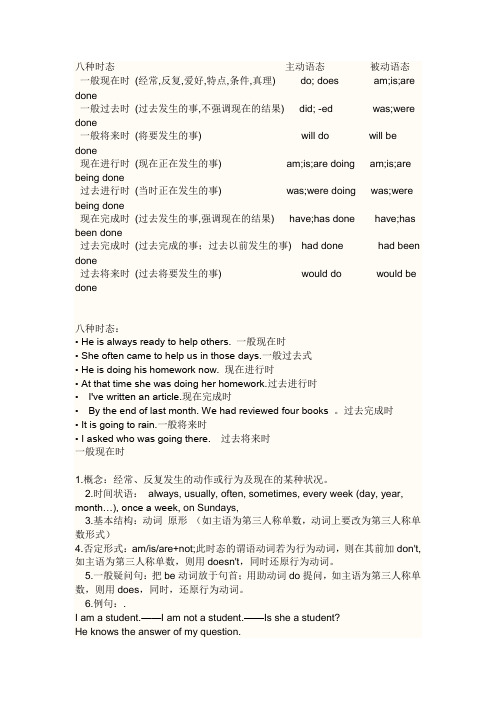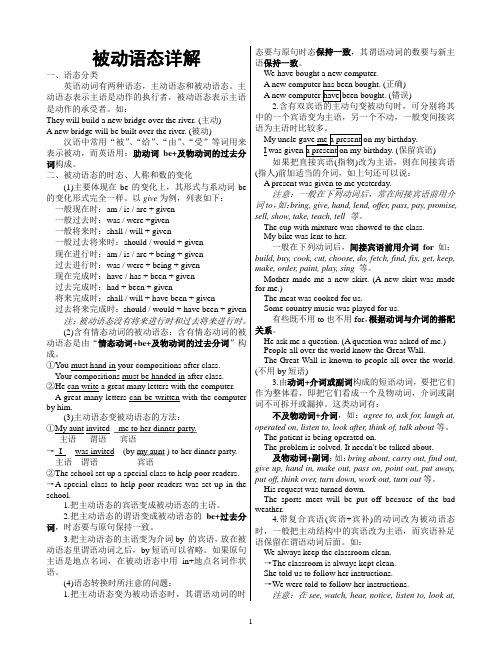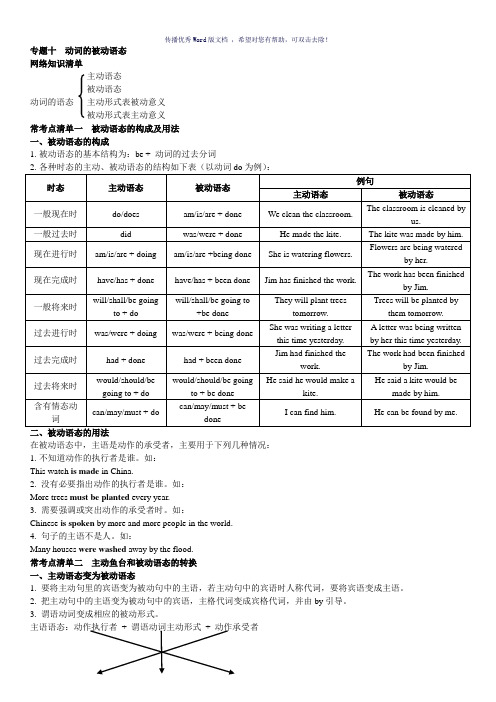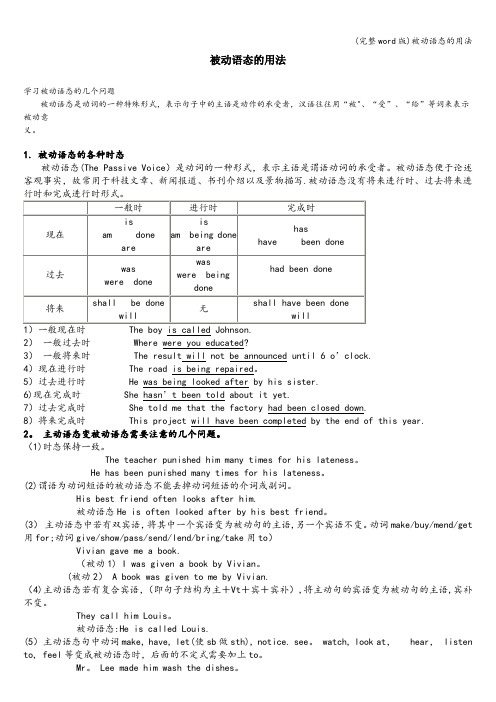(完整word版)被动语态.docx
(完整word版)八种时态主动语态被动语态

八种时态主动语态被动语态一般现在时(经常,反复,爱好,特点,条件,真理) do; does am;is;are done一般过去时(过去发生的事,不强调现在的结果) did; -ed was;were done一般将来时(将要发生的事) will do will be done现在进行时(现在正在发生的事) am;is;are doing am;is;are being done过去进行时(当时正在发生的事) was;were doing was;were being done现在完成时(过去发生的事,强调现在的结果) have;has done have;has been done过去完成时(过去完成的事;过去以前发生的事) had done had been done过去将来时(过去将要发生的事) would do would be done八种时态:• He is always ready to help others. 一般现在时• She often came to help us in those days.一般过去式• He is doing his homework now. 现在进行时• At that time she was doing her homework.过去进行时• I've written an article.现在完成时• By the end of last month. We had reviewed four books 。
过去完成时• It is going to rain.一般将来时• I asked who was going there. 过去将来时一般现在时1.概念:经常、反复发生的动作或行为及现在的某种状况。
2.时间状语:always, usually, often, sometimes, every week (day, year, month…), once a week, on Sundays,3.基本结构:动词原形(如主语为第三人称单数,动词上要改为第三人称单数形式)4.否定形式:am/is/are+not;此时态的谓语动词若为行为动词,则在其前加don't,如主语为第三人称单数,则用doesn't,同时还原行为动词。
被动语态详解(Word版)

被动语态详解一、语态分类英语动词有两种语态,主动语态和被动语态。
主动语态表示主语是动作的执行者,被动语态表示主语是动作的承受者。
如:They will build a new bridge over the river. (主动)A new bridge will be built over the river. (被动)汉语中常用“被”、“给”、“由”、“受”等词用来表示被动,而英语用:助动词be+及物动词的过去分词构成。
二、被动语态的时态、人称和数的变化(1)主要体现在be的变化上,其形式与系动词be 的变化形式完全一样。
以give为例,列表如下:一般现在时:am / is / are + given一般过去时:was / were +given一般将来时:shall / will + given一般过去将来时:should / would + given现在进行时:am / is / are + being + given过去进行时:was / were + being + given现在完成时:have / has + been + given过去完成时:had + been + given将来完成时:shall / will + have been + given过去将来完成时:should / would + have been + given 注:被动语态没有将来进行时和过去将来进行时。
(2)含有情态动词的被动语态:含有情态动词的被动语态是由“情态动词+be+及物动词的过去分词”构成。
①You must hand in your compositions after class.Your compositions must be handed in after class.②He can write a great many letters with the computer.A great many letters can be written with the computer by him.(3)主动语态变被动语态的方法:①My aunt invited me to her dinner party.主语谓语宾语→I was invited (by my aunt ) to her dinner party.主语谓语宾语②The school set up a special class to help poor readers. →A special class to help poor readers was set up in the school.1.把主动语态的宾语变成被动语态的主语。
(完整word)中考英语语法专题————被动语态、 主谓一致、倒装 、简单句、并列句 、复合句

【中考英语专项复习-(一)语态:主动语态表示主语是动作的执行者.例如:Many people speak Chinese.\\谓语:speak的动作是由主语many people来执行的。
被动语态表示主语是动作的承受者,即行为动作的对象.例如:Chinese is spoken by many people. 主语English是动词speak的承受者。
(二)被动语态的构成be的变化表现出来(三)(1)不知道或没有必要说明动作的执行者是谁。
例如:This bridge was founded in 1981。
这座桥竣工于1981年。
(2)强调动作的承受者,而不强调动作的执行者。
例如:Your homework must be finished on time.你们的家庭作业必须及时完成。
(四)主动语态变被动语态的方法(1)把主动语态的宾语变为被动语态的主语.(2)把谓语变成被动结构(be+过去分词) (根据被动语态句子里的主语的人称和数,以及原来主动语态句子中动词的时态来决定be的形式).(3)把主动语态中的主语放在介词by之后作宾语,将主格改为宾格。
例如:They make the bikes in the factory. → The bikes are made by them in the factory。
He cut down a tree. → A tree was cut down by him.(五)被动语态的特殊结构形式1)带情态动词的被动结构。
其形式为:情态动词+be+过去分词。
例The baby should be taken good care of by the baby—sitter.2)有些动词可以有两个宾语,在用于被动结构时,可以把主动结构中的一个宾语变为主语,另一宾语仍然保留在谓语后面。
通常变为主语的是间接宾语。
例His mother gave him a present for his birthday.可改为 He was given a present by his mother for his birthday.3)在使役动词have, make, get以及感官动词see, watch, notice, hear, feel, observe等后面不定式作宾语补语时,在主动结构中不定式to要省略,但变为被动结构时,要加to。
被动语态(完整版)

被动语态(完整版)一、选择题1.The school hall ________ next week to celebrate this year's Science & Technology Festival. A.is decorated B.will decorate C.is decorating D.will be decorated 2.—Excuse me, when can we play basketball in the playground?— Not until the playground ________ next week.A.repairs B.will be repaired C.is repaired D.will repair3.--Can Mr. King spare some time for the charity show?--If he ___, he will try his best to make it.A.will be invited B.is invitedC.invites D.invited4.—Aunt Li, who is the pretty girl in red in the picture?—It’s my daughter. The picture________10 years ago.A.took B.is taken C.has taken D.was taken 5.— How is the case going on?—I’ve no idea. It at the meeting right away.A.discussed B.will discuss C.is discussed D.will be discussed 6.It's reported that Nanjing metro line 5 __________ in July next year.A.complete B.is completed C.will complete D.will be completed 7.The villagers expect that the bridge_______before the rainy season comes.A.is completed B.was completed C.will be completed D.has been completed 8.— Daddy, when will we go out to fly a kite?— As soon as your homework _________.A.will finish B.will be finished C.is finished D.finishes 9.When you visit a museum, some instructions should ________ and we’d better not ________ them.A.pay attention to; be against B.be paid attention; againstC.be paid attention to; against D.be paid attention to; be against 10.—Have you finished your report, Jim?—Not yet. I will make it if I________ two more days.A.give B.will give C.am given D.will be given 11.Don't touch that machine ________ you ________.A.if; are allowed B.unless; are allowedC.if; allow D.unless; are allowed to12.— Amy, do you know what will happen in Dongtai?— The high-speed railway from Yancheng to Nantong ________ soon.A.will be completed B.will complete C.was completed D.completed 13.—Excuse me, sir. When can we drive on the highway? —Not until it ________next week. A.is built B.builds C.will build D.will be built 14.一The manager has come back from his business trip. He's asking you for the report.一Oh, my god! I haven't finished it yet. But he ________ back at the company tomorrow. A.will expect B.expected C.was expected D.is expected 15.— Soccer first started in England in the 12th century, didn't it?— Yes, but now it ________all over the world.A.plays B.is played C.is playing D.has played 16.Last March, thousands of trees ______ along the street to make our city more beautiful. A.were planted B.were planting C.would plant D.planted 17.Different kinds of robots________in the coming robot show in our city.A.display B.are displayed C.will display D.will be displayed 18.—My father works in Pukou . He spends much time driving home every day.—Don’t worry about that. It’ll be easier when th e bridge ________.A.repairs B.will repair C.is repaired D.will be repaired 19.—How do you like the poem ? —It’s a bit too long, but anyway, it________well. A.reads B.is read C.is reading D.has read20.As soon as books ________, the volunteers posted them to the students in Hope Primary School.A.are raised B.were raised C.raised D.have raised 21.—If you ________ another chance next time, can you do it better, Jack?—That’s for sure. Trust me!A.give B.will give C.are given D.will be given 22.—Mr Yang, when shall we leave school this afternoon?—Not until the classroom _______.A.has cleaned B.will clean C.will be cleaned D.is cleaned 23.Have you heard that the big event Olympics in Tokyo________until next year?A.is put off B.was putted off C.would be put off D.will be put off 24.The twins ________ the guitar at this time the day before yesterday. I think they might be preparing for the art festival these days.A.were heard playing B.heard to play C.heard playing D.were heard to play 25.The 2022 Winter Olympics ________ in Beijing.A.hold B.are holding C.will hold D.will be held 26.With the development of 5G technology, more self-driving cars ________ in the near future. A.use B.are used C.will use D.will be used 27.Yancheng SRT Line 1 ________ last year, now it makes people’s life easier and faster. A.finished B.was finished C.is finished D.finishes 28.Your order ________ if you fail to pay for it in 15 minutes on Meituan.A.cancels B.is cancelled C.will cancel D.will be cancelled 29.— Who got the first prize?— Millie did. The result ______ just now.A.is announced B.announce C.was announced D.announced 30.Last year, five Chinese teachers ________ to a school in the UK to teach the British studentsin Chinese styles for four weeks.A.were sent B.sent C.have sent D.have been sent 31.—It’s so cold! Why not close the window?—Sorry. It________. I’ll have it________.A.won’t be shut , repaired B.won’t shut , repairingC.haven’t shut , repairing D.isn’t shutting , repairing32.When the new city square ________ next year, it will be a good place for people to relax. A.will be finished B.is finishing C.was finished D.is finished 33.The 2nd Games of Qinhuai District ________ on March 28, 2021 to make more people realize the importance of health.A.held B.has held C.is held D.was held34.—A meeting ________ in our community to show people how to sort their garbage this weekend.—That’s great. Let’s go to the meeting together.A.will hold B.will be held C.hold D.is held 35.—Aunt Li, who is the lovely boy in red in the picture?—It’s my son. The picture ________ 10 years ago.A.took B.is taken C.has taken D.was taken 36.—A great deal of money ________ at the charity show!—Yes, but the cost of living ________ a lot, so we still need to do a lot for the children in poor areas.A.raised; rose B.raised; has risen C.was raised; rose D.was raised; has risen37.The 24th Winter Olympic Games ________ in Beijing on February 2, 2022.A.is held B.will be held C.was held D.are hold 38.Now waste from daily life in the city of Suzhou ________ to be separated into four different groups.A.is requiring B.is required C.was required D.required 39.—Are you going to Sam’s birthday party the day after tomorrow?—I’m not sure. I will go with you if I ______.A.will invite B.invite C.will be invited D.am invited 40.When waste from daily life ________, people won’t mix some resources with wet waste. A.separated B.is separated C.separates D.will be separated 【参考答案】一、选择题1.D【详解】句意:为庆祝即将举行的科学技术节,学校大堂下个月就要装修。
专题10动词的被动语态Word版

专题十动词的被动语态网络知识清单主动语态被动语态动词的语态主动形式表被动意义被动形式表主动意义常考点清单一被动语态的构成及用法一、被动语态的构成1.被动语态的基本结构为:be + 动词的过去分词在被动语态中,主语是动作的承受者,主要用于下列几种情况:1.不知道动作的执行者是谁。
如:This watch is made in China.2. 没有必要指出动作的执行者是谁。
如:More trees must be planted every year.3. 需要强调或突出动作的承受者时。
如:Chinese is spoken by more and more people in the world.4. 句子的主语不是人。
如:Many houses were washed away by the flood.常考点清单二主动鱼台和被动语态的转换一、主动语态变为被动语态1. 要将主动句里的宾语变为被动句中的主语,若主动句中的宾语时人称代词,要将宾语变成主语。
2. 把主动句中的主语变为被动句中的宾语,主格代词变成宾格代词,并由by引导。
3. 谓语动词变成相应的被动形式。
主语语态:动作执行者+ 谓语动词主动形式+ 动作承受者被动语态:动作承受者+ 谓语动词被动形式+ 动作执行者如:We asked him to sing an English song. (变为被动语态)He was asked to sing an English song by us.二、带双宾语的谓语动词变为被动语态谓语动词带双宾语时,既可以将间接宾语转化为主语,也可以将直接宾语转化为主语。
若将间接宾语转化为主语,则保留直接宾语;若将直接宾语转化为主语则保留间接宾语,且在被保留的间接宾语前加上介词to或for。
如:She gave me a book. (变为被动语态)→I was given a book by her. (间接宾语me改为了主语)A book was given to me by her. (直接宾语a book改为了主语)三、动词短语变为被动语态许多由不及物动词和介词、副词构成的动词短语相当于及物动词,可以有宾语,也可以有被动语态。
(完整word版)八种时态主动语态被动语态

八种时态主动语态被动语态一般现在时(经常,反复,爱好,特点,条件,真理) do; does am;is;are done一般过去时(过去发生的事,不强调现在的结果) did; -ed was;were done一般将来时(将要发生的事) will do will be done现在进行时(现在正在发生的事) am;is;are doing am;is;are being done过去进行时(当时正在发生的事) was;were doing was;were being done现在完成时(过去发生的事,强调现在的结果) have;has done have;has been done过去完成时(过去完成的事;过去以前发生的事) had done had been done过去将来时(过去将要发生的事) would do would be done八种时态:• He is always ready to help others. 一般现在时• She often came to help us in those days.一般过去式• He is doing his homework now. 现在进行时• At that time she was doing her homework.过去进行时• I've written an article.现在完成时• By the end of last month. We had reviewed four books 。
过去完成时• It is going to rain.一般将来时• I asked who was going there. 过去将来时一般现在时1.概念:经常、反复发生的动作或行为及现在的某种状况。
2.时间状语:always, usually, often, sometimes, every week (day, year, month…), once a week, on Sundays,3.基本结构:动词原形(如主语为第三人称单数,动词上要改为第三人称单数形式)4.否定形式:am/is/are+not;此时态的谓语动词若为行为动词,则在其前加don't,如主语为第三人称单数,则用doesn't,同时还原行为动词。
(完整word版)被动语态的用法

被动语态的用法学习被动语态的几个问题被动语态是动词的一种特殊形式,表示句子中的主语是动作的承受者,汉语往往用“被"、“受”、“给”等词来表示被动意义。
1. 被动语态的各种时态被动语态(The Passive Voice)是动词的一种形式,表示主语是谓语动词的承受者。
被动语态便于论述客观事实,故常用于科技文章、新闻报道、书刊介绍以及景物描写.被动语态没有将来进行时、过去将来进The boy is called Johnson.2)一般过去时 Where were you educated?3)一般将来时 The result will not be announced until 6 o’clock.4)现在进行时 The road is being repaired。
5)过去进行时 He was being looked after by his sister.6)现在完成时 She hasn’t been told about it yet.7)过去完成时 She told me that the factory had been closed down.8)将来完成时 This project will have been completed by the end of this year.2。
主动语态变被动语态需要注意的几个问题。
(1)时态保持一致。
The teacher punished him many times for his lateness。
He has been punished many times for his lateness。
(2)谓语为动词短语的被动语态不能丢掉动词短语的介词或副词。
His best friend often looks after him.被动语态He is often looked after by his best friend。
(3)主动语态中若有双宾语,将其中一个宾语变为被动句的主语,另一个宾语不变。
被动语态的结构_被动语态 英语语法.doc

被动语态的结构_被动语态被动语态的句子是以《be动词+过去分词》的形式来表达,如果要特别强调动作或行为的执行者时,句子后面需接by~,译为被(由)。
1 被动语态的句型肯定句:主语+be +过去分词+(by~).否定句:主语+be not +过去分词+(by~).一般疑问句:Be +主语+过去分词+(by~)?特殊疑问句:疑问词+be +主语+过去分词+(by~)?被动语态的时态是由be的时态决定的,be是什么时态,全句就是什么时态,be动词后面的过去分词不变。
2 被动语态的十种时态以动词give为例,其被动语态的各种时态构成如下:1.一般现在时History is made by the people.历史是人民创造的。
2.一般过去时These new cars were made in Tianjing in 1994.这些新车是1994年在天津生产的。
3.一般将来时Li Ming will be asked to attend the lecture.李明将被邀请参加讲座。
4.现在进行时A new railway is being built.一条新铁路正在修建。
5.过去进行时The roads were being widened.路那时正在加宽。
6.现在完成时He has been sent to work in Shanghai.他已经被派往去上海工作了。
7.过去完成时A new hotel had been built when I got there.我到那儿时,一座新旅馆已经建好了。
8.过去将来时He said a new hotel would be built in two months.他说两个月后新旅馆就会建好了的。
3 被动语态的否定句和疑问句English is not used in European countries.欧洲国家不使用英语。
Is English used in European countries?欧洲国家使用英语吗?1.否定句凡是有be动词的句子,其否定句都是在be动词的后面加not,被动语态也不例外。
- 1、下载文档前请自行甄别文档内容的完整性,平台不提供额外的编辑、内容补充、找答案等附加服务。
- 2、"仅部分预览"的文档,不可在线预览部分如存在完整性等问题,可反馈申请退款(可完整预览的文档不适用该条件!)。
- 3、如文档侵犯您的权益,请联系客服反馈,我们会尽快为您处理(人工客服工作时间:9:00-18:30)。
The Passive Voice
被动语态
一、被动语态的构成形式
1.被动语态的基本时态变化
1)am/is/are +done (过去分词 ) 一般现在时
2) has /have been done现在完成时
3) am/is /are being done 现在进行时
4) was/were done 一般过去时
5) had been done 过去完成时
6) was/were being done 过去进行时
7) shall/will be done 一般将来时
8) should/would be done 过去将来时
2.被动语态的特殊结构形式
1)带情态动词的被动结构。
其形式为:情态动词+ be +过去分词。
例The baby should be taken good care of by the baby-sitter.
2)有些动词可以有两个宾语,在用于被动结构时,可以把主动结构中的一个宾语变为主语,另一宾语仍
然保留在谓语后面。
例His mother gave him a present for his birthday.可改为 He was given a present by his mother for his
birthday.
3)当“动词 +宾语 + 宾语补足语”结构变为被动语
态时,将宾语变为被动结构中的主语,其余不动。
例Someone caught the boy smoking a cigarette.
可改为 The boy was caught smoking a cigarette.
4)在使役动词 have, make,let以及感官动词 see, watch, notice, hear, feel, observe等后面不定式作宾语补语时,在主动结构中不定式 to 要省略,但变为被动结构时,要
加 to。
例Someone saw a stranger walk into the building.可改为 A stranger was seento walk into the building.
5) 有些相当于及物动词的动词词组,如“动词+介词”,“动词+副词”等,也可以用于被动结构,但要把
它们看作一个整体,不能分开。
其中的介词或副词也
不能省略。
例The meeting is to be put off till Friday.
3. 非谓语动词的被动语态
ving 形式及不定式to do 也有被动语态。
例I don't like being laughed at in the public.
二、如何使用被动语态
1.讲话者不知道动作的执行者或不必说出动作的执
行者 (这时可省 by 短语 )。
例My bike was stolen last night.
2.借助被的作突出作的行者。
例I was given ten minutes to decide whether I should accept the offer.
3.了更好地安排句子。
例The well-known person got on the bus and was immediately recognized by people. (一个主就了)三、 It is said that+从句及其他似句型
一些表示“据”或“相信”的如 believe, consider, expect, report, say, suppose, think等可以用于句型“+It be+去分+ that 从句”或“主+ be+去分+ to do sth. 。
有”:
It is said that据⋯,
It is reported that据道⋯,
It is believed that大家相⋯信,
It is hoped that大家⋯希望,
It is well known that众所周⋯知,
It is thought that大家⋯ ,
It is suggested that 据建⋯。
四、的主形式表示被意
1.英中有很多如break, catch,clean,drive,lock,open,sell,read,write ,wash 等,当它被用
作不及物动词来描述主语特征时,常用其主动形
式表达被动意义 ,主语通常是物。
例This kind of cloth washes well.
注意:主动语态表被动强调的是主语的特征,而被动
语态则强调外界作用造成的影响。
试比较: The door won't lock.(指门本身有毛病)The door won't be locked .(指不会有人来锁门 , 指“门没有锁”是人的原因)
2.表示“发生、进行”的不及物动词和短语,如:happen, last, take place, break out, come out, come about, come true, run out, give out, turn out 等以主动形式表示被动
意义。
例How do the newspapers come out? 这些报纸是如
何印出来的呢?
3.系动词没有被动形式 , 但有些表示感受、感官的系
动词 feel, sound, taste, look, feel 等在主系表结构中常
以主动形式表示被动意义。
例Your reason sounds reasonable.
五、非谓语动词的主动形式表被动意义
在某些句型中可用动名词和不定式的主动形式表被
动意义。
1.在 need,want,require, bear 等词的后面,动名
用主形式表示被意,其含相当于不定式的被形
式。
例The house needs repairing(to be repaired).房子
需要修理。
2.形容 worth 后面跟名的主形式表示被含,但不能跟不定式;而 worthy 后面跟不
定式的被形式。
例The picture-book is well worth reading.(= The picture-book is very worthy to be read.)
4.在某些“形容+不定式”做表或足的构中,句
子的主或又是不定式的,常用不定式的主形式
表达被意。
些形容有 nice,easy,fit ,hard,difficult ,important,
impossible,pleasant,interesting 等。
例This problem is difficult to work out . (可看作 to work out 省略了 for me).
5.在 too ⋯ to ⋯构中,不定式前面可加主,所以用主形式表示被意。
例This book is too expensive (for me) to buy.。
